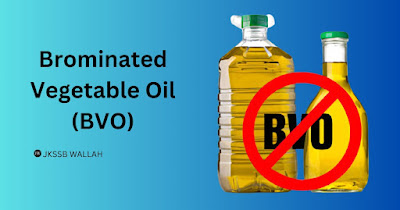What is Brominated Vegetable oil
Brominated vegetable oil (BVO) is a food additive that is derived from vegetable oil and chemically modified by adding bromine atoms. The addition of bromine to the vegetable oil alters its properties, making it an effective emulsifier and stabilizer in certain beverages.
Process of Making BVO
The process of introducing bromine into vegetable oil to create BVO involves the following steps:
1. Selection of Vegetable Oil:
The first step is to choose a suitable vegetable oil as the base. Common sources include soybean oil, corn oil, or palm oil.
2. Bromination:
Bromine is added to the vegetable oil. This process involves reacting the oil with elemental bromine, which incorporates bromine atoms into the molecular structure of the oil. The specific conditions and techniques for bromination may vary depending on the manufacturer.
3. Emulsification:
The resulting brominated vegetable oil is a surfactant, meaning it has both hydrophilic (water-loving) and lipophilic (oil-loving) properties. This enables it to act as an emulsifier, helping to disperse and stabilize flavor oils in beverages that would otherwise separate.
4. Beverage Application:
BVO is typically used in citrus-flavored soft drinks and beverages where it aids in maintaining a uniform distribution of the flavoring agents throughout the liquid.
Sources of BVO:
Brominated vegetable oil (BVO) is derived from vegetable oil, but it undergoes a chemical modification process to introduce bromine atoms. The exact sources of the vegetable oil used to produce BVO may vary depending on the manufacturer. Common sources of vegetable oil for BVO production include:
1. Soybean Oil: Soybean oil is a widely used vegetable oil and can be a source for BVO production.
2. Corn Oil: Corn oil, extracted from corn germ, is another commonly used vegetable oil that can serve as a source for BVO.
3. Palm Oil: Palm oil, derived from the fruit of oil palm trees, is also a potential source of vegetable oil for BVO production.
Harmful effects of Brominated vegetable oil (BVO)
Brominated vegetable oil (BVO) has been associated with certain health effects, particularly when consumed in excessive amounts. Here are some potential effects of BVO:
1. Bromism:
High levels of bromine intake from BVO can lead to a condition called bromism. Symptoms of bromism may include neurological issues such as memory loss, tremors, confusion, fatigue, and difficulty coordinating movements.
2. Thyroid Function:
Bromine, a component of BVO, can interfere with thyroid function. It competes with iodine, which is essential for thyroid hormone production. Prolonged exposure to high levels of bromine may potentially disrupt thyroid hormone synthesis and function.
3. Hormonal Effects:
Some studies have suggested that BVO may have estrogenic properties, meaning it could mimic or interfere with the effects of estrogen in the body. However, further research is needed to fully understand the extent and significance of these effects.
4. Kidney and Liver Effects:
Animal studies have indicated that high doses of bromine can have adverse effects on the kidneys and liver. However, the relevance of these findings to human health and the levels of BVO typically consumed in beverages is not well-established.
The potential health effects of BVO are primarily associated with excessive or prolonged consumption. The usage of BVO as a food additive is regulated in various countries, and permissible levels are established to ensure safety. However, due to concerns and regulations, many manufacturers have sought alternative emulsifiers to replace BVO in their products.

